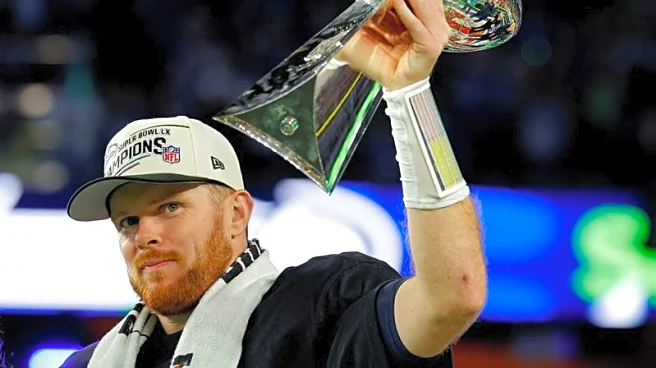What's Happening?
The Seattle Mariners are positioned as the leading contenders to sign Josh Naylor, a first baseman who has become a key player for the team. Naylor, who joined the Mariners at the trade deadline, has significantly
improved the team's first-base position and added versatility with 19 stolen bases in 51 games. As Naylor enters free agency, the Mariners are motivated to retain him, given his impact and potential market value. Ryan Divish of the Seattle Times reports that the Mariners have prioritized Naylor's signing, although competition from other teams like the New York Mets, Boston Red Sox, and Texas Rangers could complicate negotiations.
Why It's Important?
Securing Josh Naylor would be a strategic move for the Mariners, enhancing their lineup stability and offensive capabilities. Naylor's performance has made him a valuable asset, and retaining him could bolster the team's chances in future seasons. The Mariners' willingness to invest in Naylor reflects their commitment to building a competitive roster, which is crucial for maintaining fan engagement and achieving postseason success. Additionally, Naylor's potential contract, projected at $92 million over four years, aligns with the Mariners' budgetary constraints, making it a feasible investment.
What's Next?
The Mariners will continue negotiations with Naylor, aiming to finalize a deal that satisfies both parties. As free agency progresses, the team must navigate potential offers from rival clubs, which could influence Naylor's decision. The Mariners' ability to secure Naylor will depend on their financial flexibility and strategic planning, as well as their capacity to address any unforeseen challenges in the market.
Beyond the Headlines
The pursuit of Josh Naylor highlights the complexities of MLB free agency, where teams must balance financial considerations with player performance and market dynamics. The Mariners' focus on Naylor illustrates the broader trend of teams prioritizing versatile players who can contribute in multiple areas. This approach not only enhances team performance but also reflects the evolving nature of baseball, where adaptability and strategic foresight are key to success.










